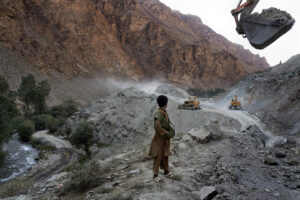KABUL (SW) – Amidst the backdrop of Afghanistan’s agricultural landscape, there shines a glimmer of hope for increased wheat production this year due to favorable climate conditions.
Following a relatively dry spell, the country has ushered in its spring season with abundant rainfall, especially in the provinces where farmers eagerly anticipate a bountiful harvest from their wheat fields.
The Ministry of Agriculture, Irrigation, and Livestock of the Islamic Emirate, expresses optimism regarding this year’s wheat yields. Despite refraining from providing specific figures on nationwide wheat cultivation, the ministry highlights the favorable conditions brought about by recent rainfall, poised to significantly enhance wheat output across the country.
Misbahuddin Mostaeen, spokesperson for the ministry, says, “The recent rains have played a crucial role in increasing production. With an expanded cultivation area, particularly in fertile lands, we anticipate a notable increase in wheat yields this year.”
Bismillah, a farmer in Herat province, whose livelihood depends on some agricultural land, says that last year’s drought thwarted his farming efforts. However, this year, he finds renewed optimism in the abundant rainfall.
Alongside this optimism, there looms concerns over potential pest infestations and hailstorms, which could threaten the crops. Bismillah, while hopeful for a successful harvest, remains wary of such challenges, emphasizing the need for continued vigilance.
“This year, there is hope if there is no calamity and if there is no hailstorm and the crops are not damaged by heavy rains, there is hope for a good result this year,” he said.
Despite the promising outlook fueled by ample spring rainfall, worries persist regarding the impact of the preceding dry winter on fallow lands across the country.
Najibullah Sadid, an expert in water and environmental affairs, highlights the unfortunate consequences faced by some agricultural areas due to cold weather and floods, potentially hindering cultivation efforts.
“Unfortunately, parts of the crops have been damaged due to the cold weather and floods. Last year, the planting season was affected by the warmth and dryness of the weather. Despite this year’s conditions being significantly better, many lands remain uncultivated. This is because in the previous season, crops were planted but were lost due to various reasons, and therefore, it is said that the lands and the capacity that should have been cultivated this year remained uncultivated,” he added.
Meanwhile, the United Nations Food and Agriculture Organization (FAO) has initiated assessments of wheat production nationwide, starting from Nangarhar province.
This initiative aims to evaluate both the quantity and quality of Afghanistan’s wheat harvest, signaling a concerted effort to support and monitor the country’s agricultural sector.






